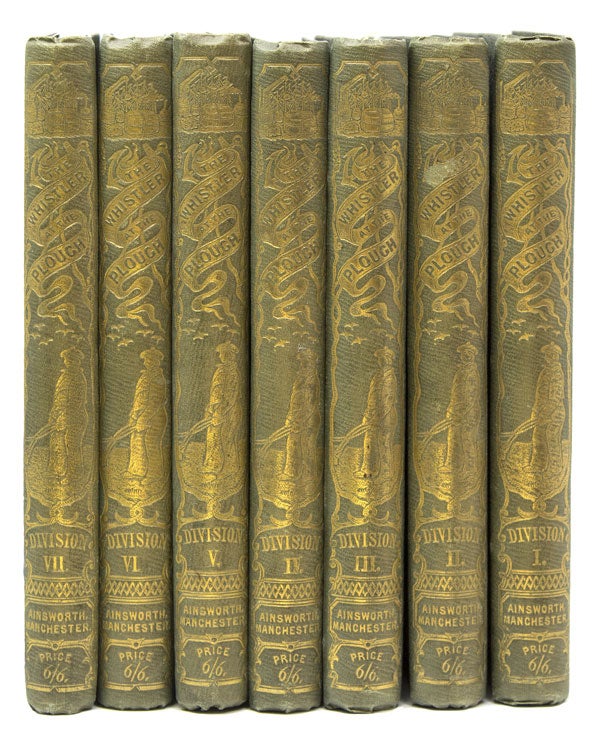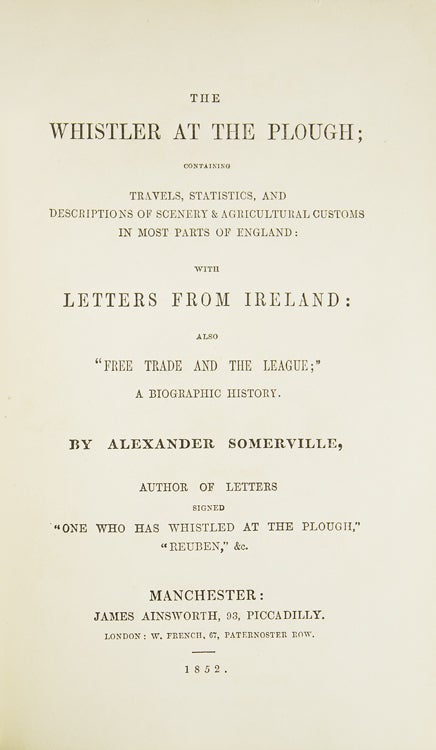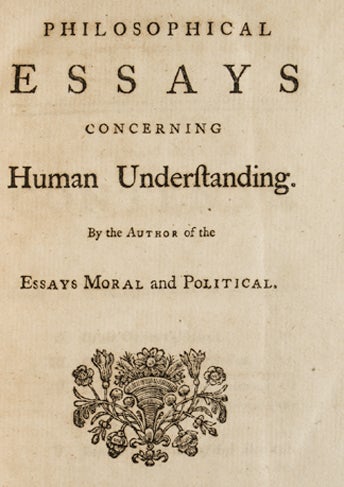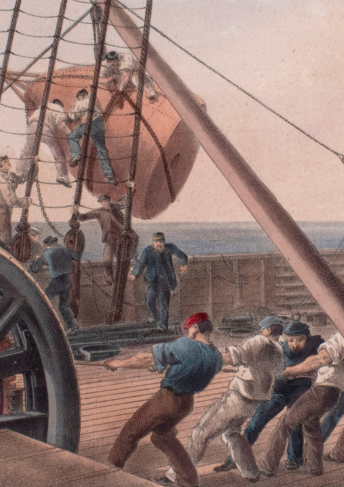BOUND CLOTH PARTS
The Whistler at the Plough; containing travels, statistics, and descriptions of scenery & agricultural customs in most parts of England: with letters from Ireland: also, "Free Trade and the League"; a biographical history.
Manchester: James Ainsworth, 1852-1853.
Price: $3,000.00
About the item
First edition, issued simultaneously in 30 serialized wrappered parts and 7 serialized bound parts (complete); later issued in 3 volumes. I: engraved frontispiece portrait, engraved title page, [iv] (title page and dedication), 288; II: 289-576; III. 577-632, [5]-228; IV. 229-516; V. 517-640, [2], [3]-160; VI. 161-448; VII. 449-597, [1], [2] (blank), [2], [2], iii-iv, [2], 641-43, i-iii pp., irregular but complete. The final part ends with advertisements for four different publishers, including Ainsworth's prospectus for this work, with a list of subscribers. 7 vols. 8vo. BOUND CLOTH PARTS. Uniformly bound in original decorated publisher's cloth; covers stamped in blind with vignettes of ocean commerce, agriculture, railroads, ships, etc.; ornate titles stamped in gilt on all upper covers, spines stamped in gilt with title, part number, and images of a ploughman, a sea port, and a factory smoke stack (similar imagery is found on the wrappered parts.) All seven bindings in fine bright condition, contents fresh and partly unopened.
Item #238612
First edition. A remarkable copy of an important and unusual book, written by a radical journalist from the ranks of the working class, documenting the reform movement in which he himself played a significant role. This is also a marvelous example of Victorian book production. Books in parts are not necessarily rare, but examples in cloth-bound parts, complete and in uniformly fine condition, are uncommon, particularly when the book happens to be a social narrative rather than fiction.
Alexander Somerville (1811-1885) was born in Scotland, the son of a carter. Self-educated and attracted to the reform movement but averse to violence and agitation, Somerville decided to become a journalist. Eventually he attracted the attention of Richard Cobden who in 1842 sent him through the country districts to collect information for the Anti-Corn Law league. As a correspondent for the Manchester Examiner Somerville toured Ireland in 1845-6, at the height of the famine. All of that and more makes up the first "volume" (632pp. comprising parts 1, 2, and a portion of part 3). Included are travels through the manufacturing and agricultural districts and observations on working class life, the poor law, tenancy, the plight of agriculture, and the horrible distress in Ireland; also a visit to Robert Owen's "Harmony Hall in 1842, and Cobbett's farm; and a valuable first-hand account of the Anti-Corn Law crusade.
Somerville (1811-1885) was born into poverty in Scotland, attended little school, and worked as a farm laborer from an early age (he would later sign his articles, "One who has whistled at the plough"). While serving in the military in Birmingham amid a controversy regarding the uncertain passage of the Reform Bill, Somerville wrote a letter arguing citizens' right to protest and petition their government. The letter made him a figure of parliamentary reform and he parlayed this notoriety into a career as an author, writing novels, histories, and works of political and economic science.
WHISTLER AT THE PLOUGH documents the mid 19th-century reform movement and the anti-Corn Law crusade, and it contains a significant first-hand account of the Irish famine. "In the spirit of a social anthropologist he described farming communities-work habits, the condition of the soil, crops, prices, rents, wages, the state of the roads, diets, dwellings, crime, discontents, religious beliefs-all laced with arguments for free trade" (ODNB). He describes his career as "'persistently devoted to public well-being and the removal of antagonism between the extremes of society'"(ibid).
Very rare in this format, and in this condition. Copies located are all "three volumes." This format may have served as a limited deluxe edition, paralleling the issue in wrappered parts, for "patrons" and subscribers: Ainsworth's prospectus lists Prince Albert, 2 dukes, 10 earls, 4 lords, Robert Peel (4 copies) and John Bright as patrons, as well as 80 ordinary subscribers.





